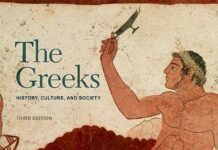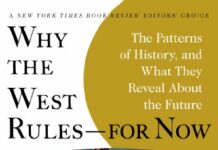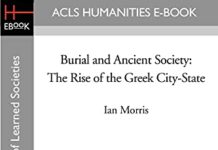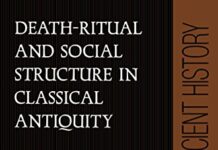
Ebook Info
- Published: 2013
- Number of pages: 400 pages
- Format: PDF
- File Size: 3.10 MB
- Authors: Ian Morris
Description
A groundbreaking look at Western and Eastern social development from the end of the ice age to todayIn the past thirty years, there have been fierce debates over how civilizations develop and why the West became so powerful. The Measure of Civilization presents a brand-new way of investigating these questions and provides new tools for assessing the long-term growth of societies. Using a groundbreaking numerical index of social development that compares societies in different times and places, award-winning author Ian Morris sets forth a sweeping examination of Eastern and Western development across 15,000 years since the end of the last ice age. He offers surprising conclusions about when and why the West came to dominate the world and fresh perspectives for thinking about the twenty-first century.Adapting the United Nations’ approach for measuring human development, Morris’s index breaks social development into four traits―energy capture per capita, organization, information technology, and war-making capacity―and he uses archaeological, historical, and current government data to quantify patterns. Morris reveals that for 90 percent of the time since the last ice age, the world’s most advanced region has been at the western end of Eurasia, but contrary to what many historians once believed, there were roughly 1,200 years―from about 550 to 1750 CE―when an East Asian region was more advanced. Only in the late eighteenth century CE, when northwest Europeans tapped into the energy trapped in fossil fuels, did the West leap ahead.Resolving some of the biggest debates in global history, The Measure of Civilization puts forth innovative tools for determining past, present, and future economic and social trends.
User’s Reviews
Editorial Reviews: Review “Stanford University classicist and historian Morris follows up Why the West Rules–for Now with a sophisticated volume designed to add quantitative muscle to his earlier arguments. A big-history theorist working in a vein similar to Niall Ferguson or Jared Diamond, Morris measures societies’ historical ‘abilities to get things done in the world.’ With an impressive data array, he calibrates energy resources, social organization, war-making capacity, and information technology over time to compare the East and West. In the 21st century, he foresees a shift in global power and wealth from West to East, much as it shifted from East to West in the 19th. . . . The ingenuity and style of his arguments will make economists and historians stand up and take notice.” ― Publishers Weekly”Buttressed with numerous graphs and engagingly written, this work provides much food for thought.” ― Choice”Using a groundbreaking numerical index of social development that compares societies in different times and places, award-winning author Ian Morris gives a sweeping examination of Eastern and Western development across 15,000 years since the end of the last ice age. He offers surprising conclusions about when and why the West came to dominate the world and fresh perspectives for thinking about the twenty-first century. . . . Resolving some of the biggest debates in global history, The Measure of Civilization puts forth innovative tools for determining past, present, and future economic and social trends.” ― World Book Industry”Quantification is an invaluable tool for understanding the patterns of history. This book is to be applauded for thinking about how to measure the social competence of earlier societies.”—Gregory Clark, American Historical Review”Praise for Ian Morris: “Morris is the world’s most talented ancient historian, a man as much at home with state-of-the-art archaeology as with the classics as they used to be studied.””—Niall Ferguson, Foreign Affairs”Praise for Ian Morris: “Morris is a lucid thinker and a fine writer . . . possessed of a welcome sense of humor that helps him guide us through this grand game of history as if he were an erudite sportscaster.””—Orville Schell, New York Times Book Review Review “The Measure of Civilization is a superb model of operationalizing the social sciences. A wonderful achievement.”―Jared Diamond, author of Guns, Germs, and Steel”The Measure of Civilization is a terrific book―it will inform, stimulate, and challenge you. Beautifully summarizing and quantifying the major developments in energy capture, social organization, war technology, and categorization, storage, and communication of information over the last sixteen millennia, this book shows how far we have come and how this journey has been a cumulative process.”―Daron Acemoglu, coauthor of Why Nations Fail: The Origins of Power, Prosperity, and Poverty”Ian Morris has done it again. He has enriched the argument about ‘why the West rules’ with a treasure trove of information about social development over the last sixteen thousand years. No one seriously interested in world or ‘big’ history can afford not to read this book. It clearly and consistently told me what I needed to know about the social resources that provide the indispensable context for the interpretation of culture. And it is an enormous pleasure to read. I cannot think of another book from which I have learned so much.”―Robert N. Bellah, author of Religion in Human Evolution: From the Paleolithic to the Axial Age”This is a superb book. Measuring how societies learned to harness energy better, improve their organizational and war-making capacities, and accumulate usable information, Ian Morris has developed a terrific index of social development. His fascinating conclusions and use of data will be controversial, but this book will become a classic source for anyone studying the nature of progress from sixteen thousand years ago to now.”―Daniel Chirot, author of How Societies Change”For all those interested in why the West, not the East, industrialized first, this succinct and intelligent book provides new data, a new conceptual tool, and a promising new approach to this major question. It is a valuable, critical guide to Morris’s quantitative index of social development and important for his observations about what we can learn from existing work, what features of societies matter most, and what future research is needed.”―Philip T. Hoffman, California Institute of Technology”Morris’s work is part of a resurgence of materialist, scientific approaches in archaeology and history. As such, many will be interested in the data and methods made available by this important book. The Measure of Civilization contains valuable and useful ideas and insights.”―Michael E. Smith, Arizona State UniversityPraise for Ian Morris: “Ian Morris has returned history to the position it once held: no longer a series of dusty debates, nor simple stories―although he has many stories to tell and tells them brilliantly―but a true magister vitae, ‘teacher of life.'”―Anthony Pagden, author of Worlds at War: The 2,500-Year Struggle between East and West From the Inside Flap “The Measure of Civilization is a superb model of operationalizing the social sciences. A wonderful achievement.”–Jared Diamond, author ofGuns, Germs, and Steel”The Measure of Civilization is a terrific book–it will inform, stimulate, and challenge you. Beautifully summarizing and quantifying the major developments in energy capture, social organization, war technology, and categorization, storage, and communication of information over the last sixteen millennia, this book shows how far we have come and how this journey has been a cumulative process.”–Daron Acemoglu, coauthor ofWhy Nations Fail: The Origins of Power, Prosperity, and Poverty”Ian Morris has done it again. He has enriched the argument about ‘why the West rules’ with a treasure trove of information about social development over the last sixteen thousand years. No one seriously interested in world or ‘big’ history can afford not to read this book. It clearly and consistently told me what I needed to know about the social resources that provide the indispensable context for the interpretation of culture. And it is an enormous pleasure to read. I cannot think of another book from which I have learned so much.”–Robert N. Bellah, author of Religion in Human Evolution: From the Paleolithic to the Axial Age”This is a superb book. Measuring how societies learned to harness energy better, improve their organizational and war-making capacities, and accumulate usable information, Ian Morris has developed a terrific index of social development. His fascinating conclusions and use of data will be controversial, but this book will become a classic source for anyone studying the nature of progress from sixteen thousand years ago to now.”–Daniel Chirot, author ofHow Societies Change”For all those interested in why the West, not the East, industrialized first, this succinct and intelligent book provides new data, a new conceptual tool, and a promising new approach to this major question. It is a valuable, critical guide to Morris’s quantitative index of social development and important for his observations about what we can learn from existing work, what features of societies matter most, and what future research is needed.”–Philip T. Hoffman, California Institute of Technology”Morris’s work is part of a resurgence of materialist, scientific approaches in archaeology and history. As such, many will be interested in the data and methods made available by this important book.The Measure of Civilization contains valuable and useful ideas and insights.”–Michael E. Smith, Arizona State UniversityPraise for Ian Morris: “Ian Morris has returned history to the position it once held: no longer a series of dusty debates, nor simple stories–although he has many stories to tell and tells them brilliantly–but a truemagister vitae, ‘teacher of life.'”–Anthony Pagden, author of Worlds at War: The 2,500-Year Struggle between East and West From the Back Cover “The Measure of Civilization is a superb model of operationalizing the social sciences. A wonderful achievement.”–Jared Diamond, author of Guns, Germs, and Steel”The Measure of Civilization is a terrific book–it will inform, stimulate, and challenge you. Beautifully summarizing and quantifying the major developments in energy capture, social organization, war technology, and categorization, storage, and communication of information over the last sixteen millennia, this book shows how far we have come and how this journey has been a cumulative process.”–Daron Acemoglu, coauthor of Why Nations Fail: The Origins of Power, Prosperity, and Poverty”Ian Morris has done it again. He has enriched the argument about ‘why the West rules’ with a treasure trove of information about social development over the last sixteen thousand years. No one seriously interested in world or ‘big’ history can afford not to read this book. It clearly and consistently told me what I needed to know about the social resources that provide the indispensable context for the interpretation of culture. And it is an enormous pleasure to read. I cannot think of another book from which I have learned so much.”–Robert N. Bellah, author of Religion in Human Evolution: From the Paleolithic to the Axial Age”This is a superb book. Measuring how societies learned to harness energy better, improve their organizational and war-making capacities, and accumulate usable information, Ian Morris has developed a terrific index of social development. His fascinating conclusions and use of data will be controversial, but this book will become a classic source for anyone studying the nature of progress from sixteen thousand years ago to now.”–Daniel Chirot, author of How Societies Change”For all those interested in why the West, not the East, industrialized first, this succinct and intelligent book provides new data, a new conceptual tool, and a promising new approach to this major question. It is a valuable, critical guide to Morris’s quantitative index of social development and important for his observations about what we can learn from existing work, what features of societies matter most, and what future research is needed.”–Philip T. Hoffman, California Institute of Technology”Morris’s work is part of a resurgence of materialist, scientific approaches in archaeology and history. As such, many will be interested in the data and methods made available by this important book. The Measure of Civilization contains valuable and useful ideas and insights.”–Michael E. Smith, Arizona State UniversityPraise for Ian Morris: “Ian Morris has returned history to the position it once held: no longer a series of dusty debates, nor simple stories–although he has many stories to tell and tells them brilliantly–but a true magister vitae, ‘teacher of life.'”–Anthony Pagden, author of Worlds at War: The 2,500-Year Struggle between East and West About the Author Ian Morris is the Jean and Rebecca Willard Professor of Classics and professor of history at Stanford University. His most recent book is the award-winning Why the West Rules–for Now: The Patterns of History, and What They Reveal about the Future (Farrar, Straus and Giroux) which has been translated into eleven languages. Read more
Reviews from Amazon users which were colected at the time this book was published on the website:
⭐I did really buy this book, and am about 20 pages from the end, but, oh my, what, in my opinion, a dis-service the author has done to his own arguments and to his own obvious erudition. My objections are three-fold, one stylistic, two conceptual. First, stylistic. Suppose I told you I was going to give you a historical analysis of some factor over the preceding 14,000 years. And then I did so by examining it’s development from 2000 CE to the present, then from 1900 to 2000, then from 1700 to 1900, then from 800 to 1700, from 450 BCE to 800 CE and so on all the way back down through prehistory some 14,000 years ago. But let’s complicate this a bit further. Let’s say I’m going to present this factor through TWO, mostly, but not always, isolated traditions, (East and West), again from the present to the past, but this time using DISJOINT time periods for each tradition. I DEFY you (!) to form a coherent mental narrative from any such presentation. I can only imagine the author thinks a normal narrative timeline is just too boring, and the mental gymnastics he forces on the reader to be refreshing. Or something. Now let’s look at my conceptual difficulties. The author has chosen as a convenient proxy (his word) for Civilization, War-Making! While it is certainly true that war-making has, over the ages, come to be composed of a myriad of ever-more sophisticated technological, strategic, and organizational developments, we are talking about WAR-MAKING! Making war ever more sweeping-in-scope, lethal-in-effect, and consequential-in-body-count can hardly in ANY sense be equated with development of Civilization — not, at least, in any reasonably understandable meaning of the term. It’s quite the opposite! My second conceptual problem with this book is the notion, to which the author apparently subscribes wholeheartedly, is that the consigning of what necessarily must be highly subjective and evidently contentious assessments of abstract concepts to a numerical scale in any way makes this system of assessments “scientific”, or even meaningful, for that matter. We’re talking in some cases about the subjective relative assessment, in quantitative differences, of some abstract value of 0.01 and 0.02, in an over all quantitative scale that may go as high as 500, in a time scale that may place the judgment being made to 10,000 BCE! I know the humanities are desperate to be taken seriously by the so-called “hard” sciences, but to me this is just a silly exercise in pseudo-science. I even bought his other book, and am shuddering in trepidation as to what other chronological gyrations I must yet go through to justify that purchase.I can’t tell you not to buy this book, but I do feel justified in warning you about what you can expect were you to do so.
⭐I bought the hardback, because I wanted to mark it up (good nonfiction books aren’t resalable after I read them). I’m still reading this, and will keep it in my library, but have already written a half-dozen blog posts analyzing how Dr. Morris’s model works. Those posts have proved very popular. This is not a light read, but if you are interested in archaeology and/or history, this is a must read. You will find the subject and presentation well worth your time. I suggest that those who are considering the book first watch the YouTube video by Dr. Morris with the same title as this book, which gives a preview into the author’s objectives, and his methods. There are other videos by Dr. Morris on YouTube, regarding his earlier books. They are all designed to sell his books, without spoilers. I suggest you first watch “Why the West Rules–for now,” and then the video with this book’s title. The book is an easy-to-read analysis of the ingredients which go into a model that calculates a Social Development Index which can be compared across civilizations and over the millennia. I admit I’ve gotten into it very deep, because it’s exactly what I want to compare prehistoric civilizations.
⭐A truly significant contribution to providing data to evaluate history in scientific manner. The numbers reveal important patterns that would otherwise be missed or ignored. Dr. Morris’s other texts: “Why the West Rules for Now” and “War, What Is It Good For?” should also be studied in conjunction with Jared Diamond’s “Guns, Germs and Steel” and “Collapse” and Francis Fukuyama’s masterpieces ‘Political Order” and “Political Decay”. For an great introduction to ‘Clio-dynamics’ [history as science] read Peter Turchin’s “Secular Cycles”, “Historical Dynamics” and “War and Peace and War”. These authors illuminate an understanding of human history that reveals and explains the structural problems of current events and their possible solutions. [Some key concepts to understand from the group: “How to get to Denmark Problem”, “the role of geography in determining history”, “history view from through the long lens”, “dysfunctional equilibrium”, “frontiers as incubators of group solidarity”, ‘asabiya’, etc.’]
⭐Setting aside a lot of academic – and, in some part, ideological – quibbles about his conclusions, I bought the book to learn more about his methods and methodology, which paid off well. It’s a bit drier than his other works, but provides useful ideas on developing “good enough” quantitative methods for social & economic phenomena that defy accurate quantification.
⭐Couldnt get past the first 20 pages. Im sure this book makes some interesting evaluations about the development of societies over time but Im the kind of person who just doesn’t like there to be too many numbers and equations and such.. Shouldve expected that being that theres a RULER on the cover of the book but whatever, I’ll just keep it in case a I need it for future reference haha
⭐There is a widespread belief that if something can be assigned a numerical value it can be compared to something else assigned a numerical value and that that comparison is valid. If you believe in this modern equivalent of witchcraft this book is for you. To me it is a mountain of meaningless statistical information all of it based on guesstimates based on suppositions based on hunches. In other words it’s BS squared.
⭐a terrific book. the best history of the world i’ve read since daniel boorstin’s the discoverers. and riddled with ideas.
⭐Outstanding research!
⭐This book is a companion of the separate book ‘Why the West rules for now’ from the same author. It seems some of the material in this book was originally published in the author’s website and then it was extended and transformed into this book.I found the other book ‘Why the West rules for now’ astounding in several regards and absolutely recommendable. Then I bought ‘the Measre of Civilisation’ to see if I could get more of the same. I didn’t. The Measure of Civilisation is not a continuation or extension of ‘Why the West rules for now’ but something different.’Why the West rules for now’ is a book clearly targeted to the general public not to the community of historians or scholars. Instead ‘The Measure of Civilisation’ is a book targeted to scholars. In the book “Why the West rules” the author devises an index of social developments and estimates its value throughout history in the West and the East to illustrate his point. “The Measure of Civilisation” includes details that were not included in “Why the West rules”, rightly so because they would be distracting, about how the author devised the index and how he estimates its value throughout history. It is very interesting material and well written, but I found it is mostly targeted to fellow academics wanting to reproduce his calculations and hence enrich scholars’ debate. In general, it is not something for the general reader, unless the reader is keen on technical details about that index.It is however a book worth reading. I learnt for instance, from the historical evolution of each of the 4 sub-indices, that basically only the energy capture sub-index mattered until the Industrial Revolution, the other three sub-indices about social organisation, war-making capacity and information technology hardly contributed. They only take off afterwards, but they are responsible of the sky-rocketting values for the last 2 hundred years. This observation triggers more thoughts about how this index could be improved but it is not relevant for the discussion here.The book ‘The Measure of Civilisation’ is all in all a good book but I would warn the readers that it is not more of ‘Why the West rulres for now’.
⭐Ich habe das Buch vorbestellt, weil das letzte Werk von Morris (Why the West rules?) wunderbar war. Dieses ist auch ganz OK, aber bei weitem nicht auf dem Niveau, wie das besagte letzte. Habe den Eindruck, es handelt sich bei diesem um einen Nachschuss.a technical book trying to quantify social evolution and civilization. Great attempt to organise data of a very long period of time. We can criticize but making better will be challenging !
⭐Non l’ho ancora letto però il libro, un lungo saggio, promette bene e risulta come dire attraente. l’argomento civoiltà è di significato culturale anche oggigiorno, conoscere la cultura di un popolo o di una collettività implica anche la conoscenza di costumi e consuetudini.
⭐
Keywords
Free Download The Measure of Civilization: How Social Development Decides the Fate of Nations in PDF format
The Measure of Civilization: How Social Development Decides the Fate of Nations PDF Free Download
Download The Measure of Civilization: How Social Development Decides the Fate of Nations 2013 PDF Free
The Measure of Civilization: How Social Development Decides the Fate of Nations 2013 PDF Free Download
Download The Measure of Civilization: How Social Development Decides the Fate of Nations PDF
Free Download Ebook The Measure of Civilization: How Social Development Decides the Fate of Nations




